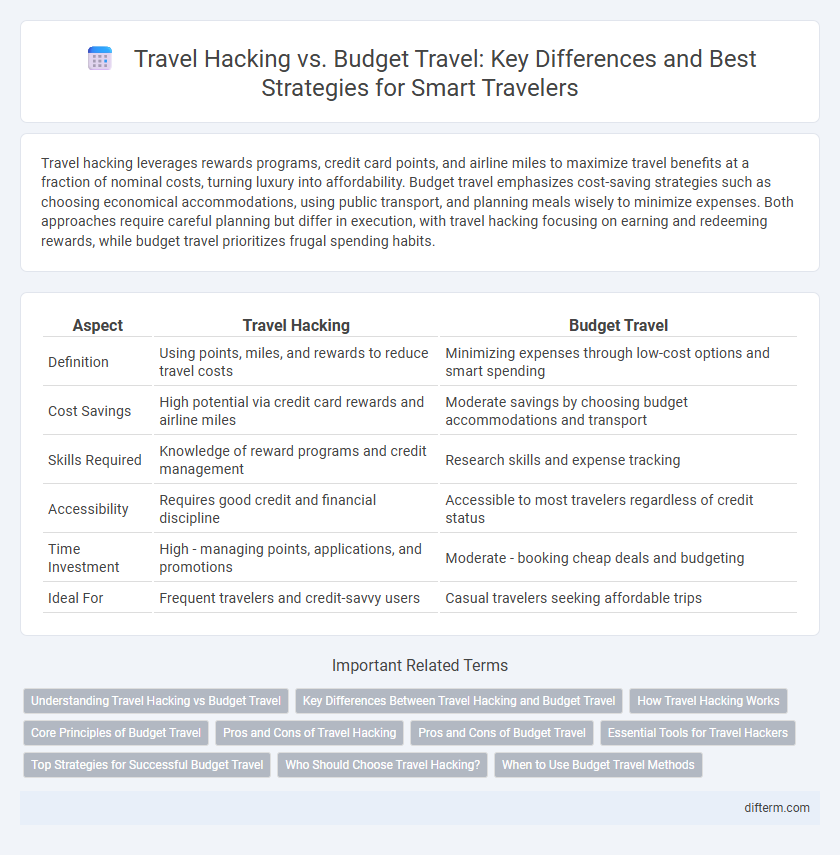Travel hacking leverages rewards programs, credit card points, and airline miles to maximize travel benefits at a fraction of nominal costs, turning luxury into affordability. Budget travel emphasizes cost-saving strategies such as choosing economical accommodations, using public transport, and planning meals wisely to minimize expenses. Both approaches require careful planning but differ in execution, with travel hacking focusing on earning and redeeming rewards, while budget travel prioritizes frugal spending habits.
Table of Comparison
| Aspect | Travel Hacking | Budget Travel |
|---|---|---|
| Definition | Using points, miles, and rewards to reduce travel costs | Minimizing expenses through low-cost options and smart spending |
| Cost Savings | High potential via credit card rewards and airline miles | Moderate savings by choosing budget accommodations and transport |
| Skills Required | Knowledge of reward programs and credit management | Research skills and expense tracking |
| Accessibility | Requires good credit and financial discipline | Accessible to most travelers regardless of credit status |
| Time Investment | High - managing points, applications, and promotions | Moderate - booking cheap deals and budgeting |
| Ideal For | Frequent travelers and credit-savvy users | Casual travelers seeking affordable trips |
Understanding Travel Hacking vs Budget Travel
Travel hacking involves strategically using loyalty programs, credit card rewards, and mistake fares to maximize travel value at minimal cost. Budget travel emphasizes low-cost accommodations, affordable transportation, and cost-effective activities to reduce overall expenses. Understanding the differences helps travelers choose between leveraging rewards for luxury experiences or strictly minimizing spending.
Key Differences Between Travel Hacking and Budget Travel
Travel hacking leverages credit card rewards, frequent flyer miles, and promotional deals to maximize travel benefits often for luxury experiences at reduced costs. Budget travel emphasizes cost-saving strategies such as staying in hostels, using public transportation, and eating local street food to minimize expenses. The key difference lies in travel hacking's focus on strategic reward accumulation versus budget travel's emphasis on frugal daily spending habits.
How Travel Hacking Works
Travel hacking leverages points, miles, and rewards programs from airlines, credit cards, and hotel chains to significantly reduce travel costs or secure free flights and upgrades. Budget travel relies on cost-cutting measures like booking in advance, choosing low-cost carriers, and staying in affordable accommodations to stretch limited funds. Travel hacking requires strategic credit card sign-ups and spending patterns, while budget travel emphasizes frugal choices and planning.
Core Principles of Budget Travel
Budget travel centers on minimizing expenses by prioritizing affordability in transportation, accommodation, and food choices. Core principles include thorough planning, flexibility with travel dates and destinations, and leveraging local resources to reduce costs. Unlike travel hacking, which exploits reward systems and promotions, budget travel emphasizes consistent money-saving habits and practical decision-making.
Pros and Cons of Travel Hacking
Travel hacking leverages loyalty programs, credit card rewards, and fare mistakess to significantly reduce travel costs, offering free flights and upgrades that budget travel alone cannot match. This approach requires careful planning, strong credit management, and can be time-intensive, with the risk of account closures or changing airline policies. Budget travel, while simpler and more flexible, typically involves straightforward cost-cutting measures without the complexity or potential payoff of travel hacking strategies.
Pros and Cons of Budget Travel
Budget travel offers significant cost savings by prioritizing affordable accommodations, public transportation, and local eateries, making it accessible for travelers with limited funds. However, the downsides include potential compromises in comfort, longer travel times, and limited access to premium experiences or amenities. Despite these challenges, budget travel encourages cultural immersion and resourcefulness, appealing to those seeking authentic, low-cost adventures.
Essential Tools for Travel Hackers
Essential tools for travel hackers include advanced flight search engines like Google Flights and ITA Matrix, which help find hidden deals and optimize routes. Utilizing reward programs such as airline miles, credit card points, and loyalty apps like AwardWallet maximizes savings and perks. Mobile apps for real-time fare alerts and flexible date searches enhance opportunities for budget-friendly travel beyond traditional budget travel strategies.
Top Strategies for Successful Budget Travel
Maximizing rewards points and leveraging airline loyalty programs are essential travel hacking techniques for reducing travel expenses. Budget travel strategies emphasize booking flights during off-peak seasons, staying in budget accommodations such as hostels or Airbnb, and utilizing public transportation to lower costs. Combining travel hacking with smart budgeting enables travelers to explore destinations affordably without sacrificing comfort or experience.
Who Should Choose Travel Hacking?
Travel hacking suits frequent flyers seeking maximum rewards from credit card points, airline miles, and loyalty programs to upgrade their travel experience. Budget travelers prioritizing strict cost-saving may find travel hacking time-consuming and complex, preferring straightforward low-cost options. Those willing to invest effort into strategic planning and leveraging exclusive deals benefit most from travel hacking's potential for luxury travel at reduced expenses.
When to Use Budget Travel Methods
Budget travel methods are ideal for trips with flexible dates, longer stays, or destinations with low accommodation and food costs. Travelers prioritizing cost savings over luxury or convenience benefit most from these strategies, such as using public transportation, staying in hostels, and eating local street food. When the goal is to stretch limited funds without relying on complex reward programs, budget travel offers a straightforward approach to minimize expenses.
travel hacking vs budget travel Infographic

 difterm.com
difterm.com